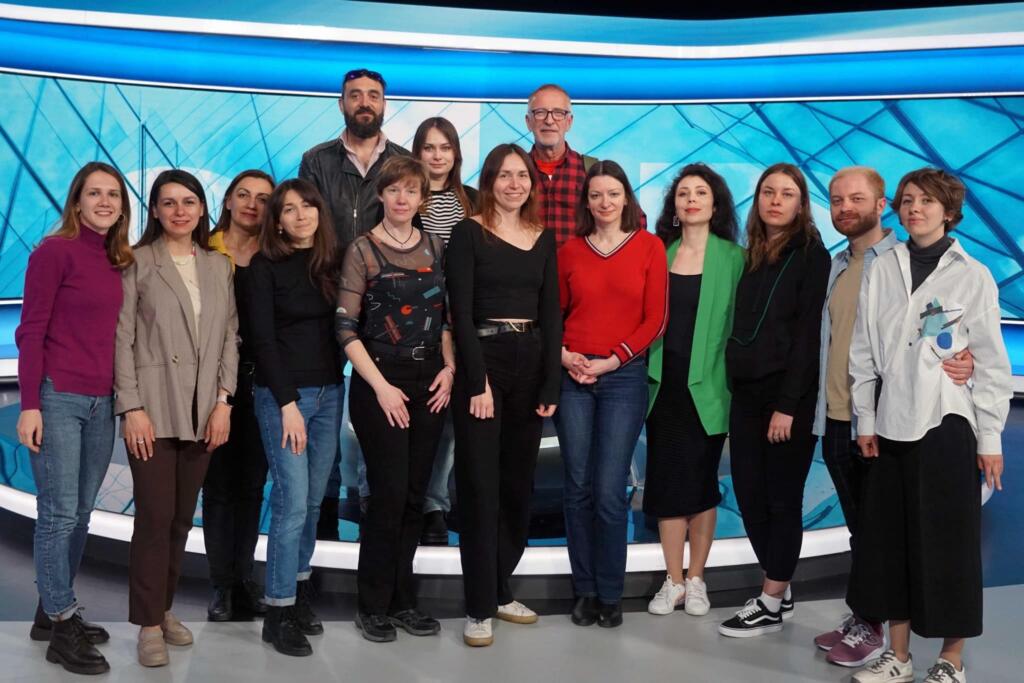

Budapest, Hungary:
The study visit of the second cohort of Ukrainian journalists, fellows of the Europe Ukraine Desk project, kicked-off in Budapest, Hungary. A key highlight was the meeting with Peter Kreko, political analyst and CEO of Political Capital, who discussed the Hungarian media landscape and the government's response to the Russo-Ukrainian war. Kreko introduced the concept of "informational autocracies," highlighting Hungary's increasingly restricted media market. Discussions also addressed the Hungarian minority in Ukraine, a significant issue in bilateral relations, with insights from Csilla Fedinec. Meetings with independent newsrooms like Magyar Hang, telex.hu, and HVG were particularly valuable, offering perspectives on media resilience against government pressure.
Observing how independent media invent unexpected ways to survive, in contrast to state media, was enlightening. The enthusiasm of journalists there is admirable, even though the situation regarding freedom of speech leaves much to be desired.
Alina Poliakova, managing editor of the English version at Ukrainska Pravda Українська правда
Sofia, Bulgaria:
Sofia was the second stop for Ukrainian journalists on the trip. For many, Bulgaria's media landscape was uncharted territory. Journalist Yavor Siderov explained Bulgaria's strategic position in energy trade routes and its current political battleground between pro- and anti-Western forces. A networking event hosted by the Association of European Journalists covered topics like energy security and Ukraine's European integration. The panel, moderated by BNR journalist Irina Nedeva, featured speakers from both Ukrainian and Bulgarian media. The group also met colleagues from Darik Radio, 24 Chasa, and NOVA TV. Oksana Khmelyovska, chief editor of Chytomo, noted the diverse and active Bulgarian media environment despite financial constraints and partial state influence, emphasizing the need for cultural exchange between the two nations.
Despite small budgets, ‘soft’ censorship, and partial state influence, Bulgaria's media are diverse in ownership and content, the media environment is active, alive, and ready to defend its rights
Oksana Khmelyovska, chief editor of Chytomo
Rome, Italy:
The final destination of the first fellow's trip was Rome, Italy. The program included visits to weekly magazines L'Espresso and Internazionale, and daily newspaper Il Foglio. Media expert Paolo Mossetti provided insights into the Italian media landscape, discussing the role of deeper cultural factors beyond Russian propaganda in Italy's support for Ukraine. Giovanni Savino, a researcher in the History of Russia, highlighted Russia's economic and cultural influence in Italy. The trip concluded with a panel discussion on the impact of Russia's invasion on EU and Ukrainian energy supplies. Energy expert Serhii Barbu informed Italian colleagues about the damage to Ukraine's energy system from Russian missile attacks, with additional insights from Gionata Picchio of Staffetta Quotidiana. This exchange helped Ukrainian journalists understand the Italian political and media landscape, aiding in the contextualization of foreign policies related to Ukraine.
In Italy, I was very surprised to see that a large part of the media does not hide its affiliation with a certain political spectrum. Some are closer to the left, some to the right, or liberals. On the one hand, this is quite unusual, but on the other hand, it helps us understand the work of such media more deeply. Accordingly, it helps to ensure that the topic of Russia's war against Ukraine is always "afloat" in these publications, radio, or TV channels
Serhii Barbu